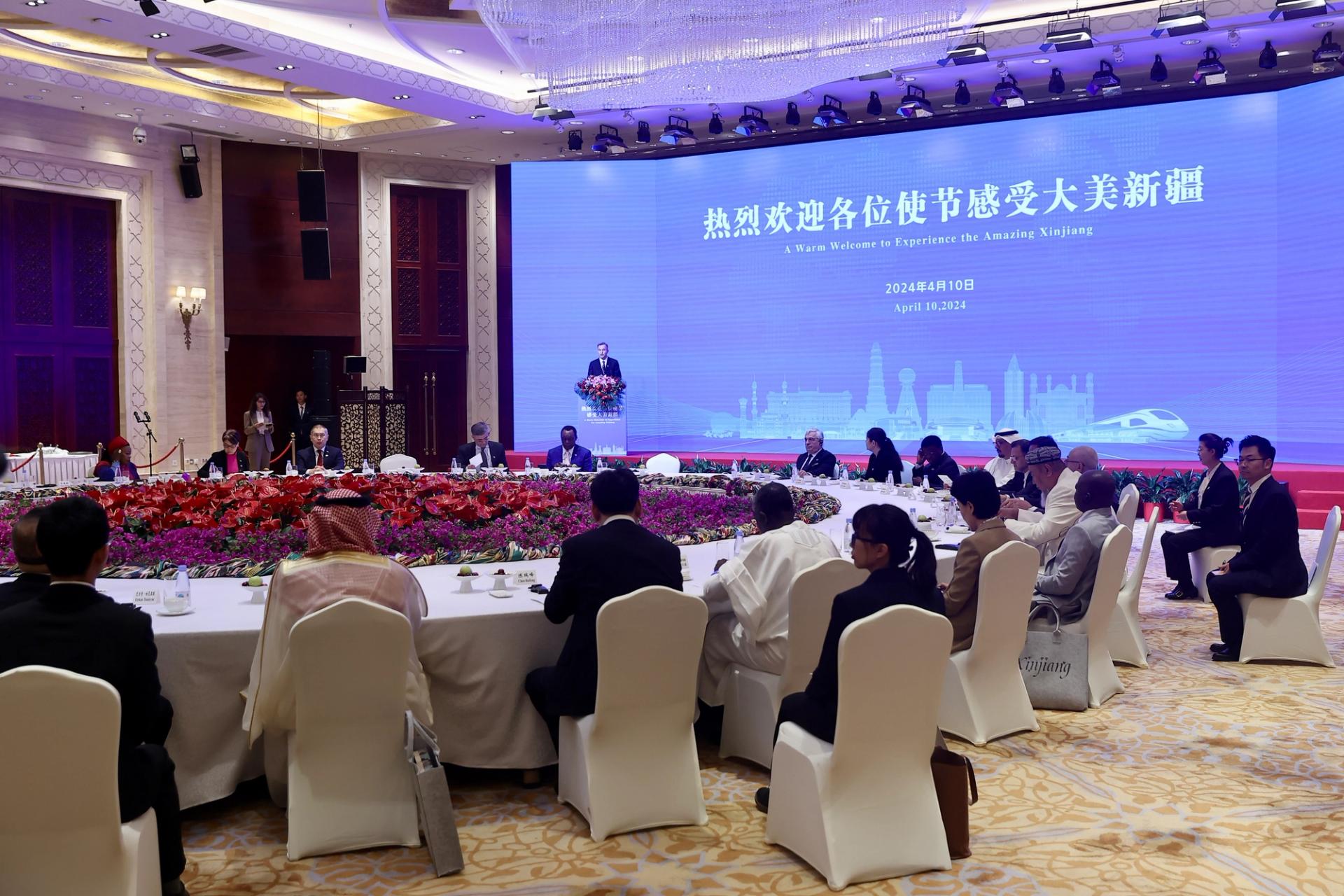Semafor Signals
Supported by
China’s Xinjiang region lures foreign diplomats to ‘rebrand’ itself
Insights from The Diplomat, Radio Free Asia, and The Information

The News
Ambassadors from a host of countries voiced support for China’s economic ambitions in Xinjiang at a reception in Beijing this week, but appeared silent on the country’s alleged human rights violations in the region.
Diplomats from 49 countries, including Pakistan, Iran, Syria, and Turkey, used an event held to mark the Muslim holiday of Eid al Fitr to tell Chinese officials how they hope to foster deeper economic ties with the strategically located, resource-rich region of Xinjiang, according to the South China Morning Post.
However, they made no public comments on Beijing’s treatment of Xinjiang’s ethnic minority Uyghurs, who human rights groups say are subjected to systematic abuses at so-called “re-education” camps, forced sterilizations, and exploitative labor. China acknowledges the existence of the camps but denies human rights allegations.
Syria’s ambassador to China denounced the “lies of some Western countries,” referring to abuse allegations in his speech, while Iran’s envoy hailed the “huge achievements” made by China in the region, citing the possibility for Iranian cooperation on energy and minerals.
Beijing aims to turn Xinjiang into a key export and production hub for its Belt and Road Initiative (BRI), China’s ambitious global infrastructure development plan.
SIGNALS
Muslim countries stay silent on Uyghur issue
The governments of Muslim-majority governments have largely stayed silent on Beijing’s reported religious discrimination and mistreatment of Uyghurs, reflecting “a prioritization of economic, political, and diplomatic relations with China” largely tied to infrastructure projects of the Belt and Road Initiative, Abdulhakim Idris of the Center for Uyghur Studies wrote for The Diplomat. Evidence suggests Beijing has funded media in these countries to portray Xinjiang in a positive light, Idris wrote, and China’s Ministry of Foreign Affairs also organizes conferences in Muslim countries to influence opinion on the issue. Such efforts have made it difficult for the international community to take action against China. In October 2022, 19 countries, including Muslim-majority nations, blocked a United Nations debate to discuss crimes against Xinjiang’s Uyghurs.
China tries to ‘rebrand’ Xinjiang
Several dignitaries at the Eid reception recounted cheerful stories about their time in Xinjiang, state media outlet China Daily reported. These carefully orchestrated visits — where diplomats are shown historical sites, cultural dances, and art — are Beijing’s effort to “rebrand Xinjiang” as a “tourist attraction” ripe with business opportunities, instead of a site of human rights violations, according to CBS News reporter Elizabeth Palmer, who was on one such trip. In what Chinese officials have called “Sinicization of Islam in Xinjiang,” Beijing claims Uyghurs are religious extremists who need to adapt their faith to make it “compatible” with Chinese values, according to Radio Free Asia. The government has banned most Uyghurs from praying at mosques during Eid citing extremism concerns.
US struggles to enforce ban on imports of forced-labor cotton
With 87% of Chinese cotton originating from Xinjiang, the U.S. has imposed a ban on imports from the region over concerns of forced Uyghur labor, but has had difficulty enforcing it. While some Chinese e-commerce apps, including Shein and TikTok, require certificates of origin to ensure manufacturers do not use Xinjiang cotton, the popular Temu app has reversed course, encouraging manufacturers to source domestic cotton instead. This move “undercuts Temu’s stance that it takes compliance with a U.S. ban on imports from Xinjiang seriously,” The Information reported. A new U.S. policy will introduce inspections on imports of $800 or less, with most orders from Chinese e-commerce apps falling below under this amount.
